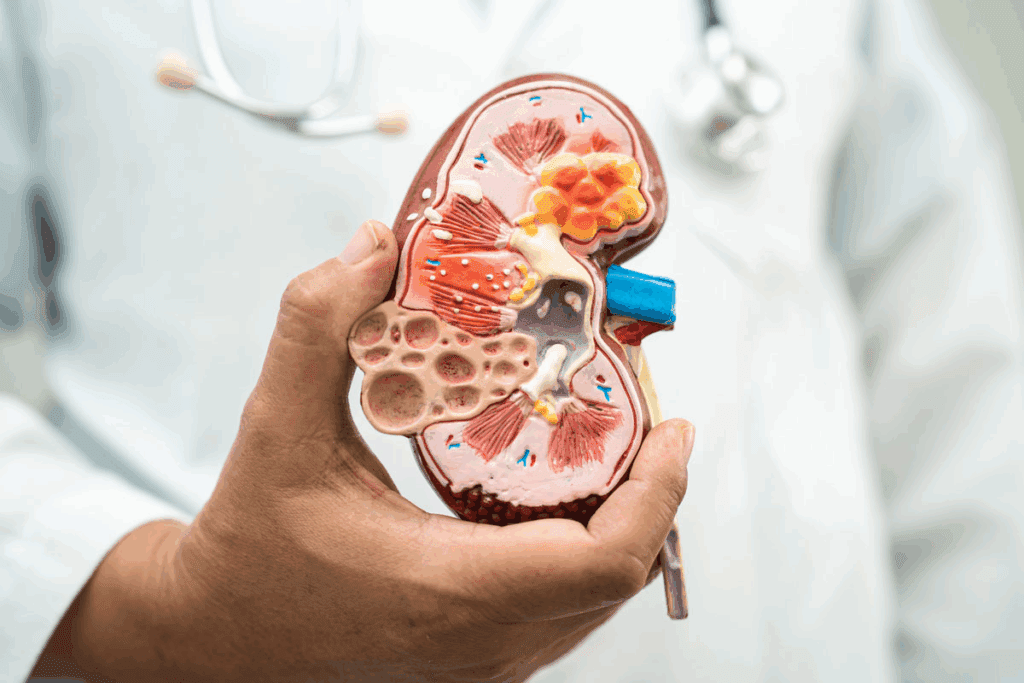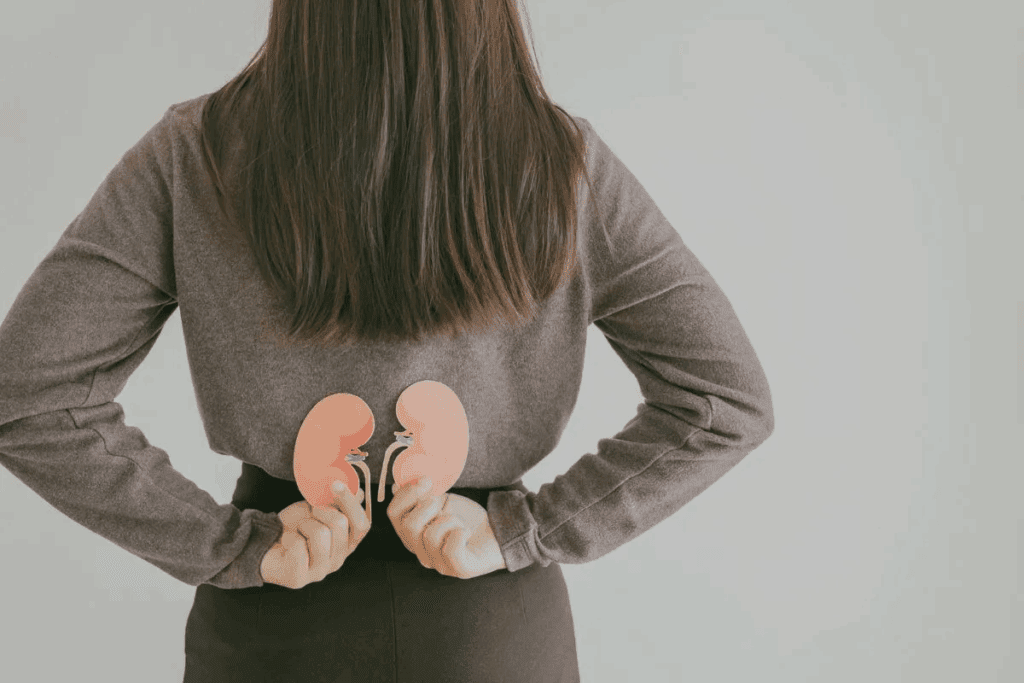
Using apple cider vinegar for kidney stones is getting more attention. This is because early studies and personal stories suggest it might help. We’ll look into the current research and how to use this natural remedy apple cider vinegar kidney stones.
Studies show that ACV could prevent kidney stones. It does this by making urine more alkaline and reducing calcium. At Liv Hospital, we focus on giving our patients the best care. We also want to help them understand the latest research so they can make smart health choices.

Kidney stones are hard deposits made of minerals and salts. They form inside the kidneys. These stones can cause severe pain, nausea, and vomiting. In some cases, they may lead to complications such as infection or kidney damage.
Kidney stones are crystalline structures that develop when there is an imbalance in the concentration of substances in the urine. This imbalance can lead to the formation of small crystals. These crystals can grow into larger stones over time.
The composition of kidney stones can vary, but most are made of calcium oxalate. Other types include uric acid stones, struvite stones, and cystine stones. Knowing the composition of a kidney stone is key for treatment and prevention.
There are several types of kidney stones, each with different causes and risk factors:
Kidney stones are a significant health issue worldwide, affecting millions of people. The prevalence of kidney stones has been increasing over the past few decades. This is likely due to factors such as diet, obesity, and dehydration.
Several risk factors contribute to the development of kidney stones, including:

To understand how apple cider vinegar affects kidney stones, we need to look at its makeup and how it works. Apple cider vinegar, or ACV, is made up of many compounds. The main one is acetic acid.
ACV is made through a two-step process with yeast and bacteria. This turns apple cider into vinegar full of acetic acid and other stuff like malic acid. The “mother” of vinegar, a cloudy part, has good bacteria and might help with health.
The exact mix of ACV can change based on the apples, the making process, and if it’s filtered or not. But, acetic acid is always the main player.
Acetic acid is key in how ACV might help with kidney stones. It does a few things:
One study found that ACV might help prevent kidney stones. It does this by raising citrate levels and cutting calcium in urine.
“The acetic acid in vinegar may help to dissolve kidney stones by increasing the solubility of stone-forming minerals.”
ACV’s effects on kidney stones come from a few places:
These ways ACV might help with kidney stones are promising. But, we need more research to really know how it works and if it’s effective.
Research on apple cider vinegar (ACV) and kidney stones is growing. Some studies hint that ACV might help prevent kidney stones. But, the evidence is not strong enough yet.
Many studies have looked into ACV’s benefits for kidney stones. A 2018 review called for more detailed clinical trials. This is to fully grasp ACV’s impact on stone formation.
Recent pilot studies show encouraging signs. For example, a small study found that ACV daily intake changed urine pH and citrate levels. These changes might lower stone risk.
Pilot studies are key in understanding ACV’s role in preventing kidney stones. A 2020 pilot study found that ACV increased urinary citrate levels. This is good because higher citrate levels can lower stone risk.
Another study looked at ACV’s effect on urinary calcium levels. This is important because calcium is a common component in kidney stones. The study suggested that ACV could reduce calcium excretion in urine.
ACV’s impact on urinary citrate and calcium levels is significant. Citrate helps prevent stone formation by binding to calcium. Higher citrate levels can stop calcium stones from forming.
The acetic acid in ACV might be behind these benefits. It could change the urine environment, making it less likely for stones to form.
Despite promising findings, current research has its limits. Many studies have small sample sizes. There’s also a need for more long-term data on ACV’s effects.
It’s also unclear what the best dose and treatment duration for ACV are. More extensive studies are needed to guide the use of ACV for kidney stone prevention.
ACV might be a good way to handle kidney stones by changing how urine works. It’s a natural option that could stop stones from forming and coming back.
ACV could help dissolve kidney stones. The acid in ACV might break down stones, making them easier to get rid of.
Studies show that ACV’s citric acid and other stuff can change urine’s pH. This makes it harder for stones to form. It might also help dissolve stones that are already there.
ACV could also help stones move through the body. It might relax the urinary tract and make urine flow better. This could reduce the pain and discomfort of kidney stones.
A study found that ACV can increase citrate levels in urine. Citrate helps stop calcium stones from forming. Calcium stones are the most common type of kidney stone.
Stopping kidney stones from coming back is important. ACV might help by changing the urine in a way that stops stones from forming.
Here’s some data on ACV’s benefits for preventing kidney stone recurrence:
| Study | Participants | Outcome |
| Pilot Study on ACV and Kidney Stones | 100 participants | Reduced stone recurrence |
| ACV Effects on Urinary Citrate | 50 participants | Increased citrate levels |
| Long-term ACV Use | 200 participants | Lower incidence of new stones |
In summary, ACV could help with kidney stones in several ways. It might dissolve stones, help them pass, and prevent them from coming back. Always talk to a doctor before trying ACV for kidney stone management.
ACV comes in many forms, each with its own benefits for kidney health. These options cater to different tastes and needs. This makes it easy to add ACV to your daily life.
Raw, unfiltered liquid ACV is very potent. It has the “mother” of vinegar, a cloudy part full of good bacteria and acids. The “mother” is thought to boost the vinegar’s health benefits, including for the kidneys.
“The ‘mother’ in ACV is a mix of enzymes, proteins, and good bacteria,” says a top nutrition expert. “It’s what makes the vinegar look cloudy and is believed to be behind many of its health perks.” Using raw, unfiltered ACV can be great for kidney health.
If you don’t like the taste of liquid ACV, gummies and supplements are good alternatives. ACV gummies are chewable and often have other ingredients to make them taste better. Supplements are in capsule or tablet form and have concentrated ACV.
While gummies and supplements are easier to use, it’s important to know what’s in them. Some might have added sugars, preservatives, or other things that could affect their health benefits. Always read the label to see how much ACV is in them and what else is there.
When looking at how well different ACV forms work, several things matter. Raw, unfiltered liquid ACV is often seen as the most powerful because of the “mother.” But, gummies and supplements offer a set amount and are easier to use.
The best ACV form for kidney health depends on what you prefer and need. Always talk to a healthcare professional before starting any new supplement, even more so if you have health issues or take medications.
When using apple cider vinegar (ACV) for kidney stones, knowing the right amount is key. ACV’s effectiveness in managing kidney stones depends on how it’s taken.
The usual ACV dosage for kidney stones is 1-2 tablespoons mixed with a large glass of water. Diluting it helps avoid side effects like tooth damage and stomach issues.
For best results, drink the ACV mix once or twice a day. Sticking to a routine is important for managing kidney stones with ACV.
The length of time you should use ACV varies. It might be short-term to help pass a stone or long-term to prevent future stones.
Knowing when you’ve had too much ACV is important. Look out for:
If you notice these signs, cut back on ACV or talk to a doctor.
| Dosage | Frequency | Duration |
| 1-2 tablespoons | Once or twice daily | Varies (short-term or long-term) |
By following these guidelines and watching how your body reacts, you can safely use ACV for kidney stone management.
To get the most out of ACV for kidney stone management, knowing how to prepare and consume it is key. Making ACV right can make it taste better and boost its benefits.
Most people dilute ACV in water. The usual mix is 1-2 tablespoons of ACV in 8 ounces of water. You can tweak this to fit your taste.
Some like their ACV diluted, while others prefer it stronger. Start with a small amount and slowly add more to get used to the taste.
When you drink ACV can affect how well it works. Many find drinking it before meals helps with digestion and prevents kidney stones.
Drinking ACV in the morning can kickstart digestion for the day. Or, having it before bed might help while you’re fasting.
Adding ACV to your meals can be fun with these recipe ideas. Here are a few:
| Recipe | Ingredients | Instructions |
| ACV Lemonade | 2 tbsp ACV, 1 lemon, 1 cup water, honey (optional) | Mix ACV and honey (if using) in water, squeeze in lemon juice, stir well. |
| ACV Spritzer | 1 tbsp ACV, 1 cup sparkling water, slice of lemon | Mix ACV in sparkling water, add a slice of lemon, serve chilled. |
| ACV Salad Dressing | 2 tbsp ACV, 1 tbsp olive oil, 1 tsp Dijon mustard | Whisk together ACV, olive oil, and Dijon mustard, season with salt and pepper to taste. |
These recipes not only make ACV taste better but also offer health perks. For example, lemons have citrate, which can help prevent kidney stones.
Using apple cider vinegar for kidney stones has its own risks and side effects. It’s usually safe but can cause problems for some people.
Some may feel side effects from apple cider vinegar. These can include:
Diluting ACV with water can help lessen these issues. Also, drinking it through a straw can protect your teeth.
Large amounts of ACV might lower potassium levels, but evidence is scarce. Monitoring potassium levels is wise for those using ACV long-term, if they’re at risk for low potassium.
Some should be careful or avoid ACV. This includes:
| Individuals | Reason to Avoid ACV |
| Those with gastroparesis or delayed stomach emptying | ACV may worsen digestive problems |
| Individuals with diabetes | ACV could affect blood sugar and interact with diabetes meds |
| People with osteoporosis or osteopenia | Too much ACV might take calcium from bones |
ACV can interact with some medications, like diuretics, laxatives, and insulin. It’s key for those on these meds to talk to their doctor before using ACV.
Knowing these risks and taking steps to avoid them can help people safely use apple cider vinegar for kidney stones.
Apple Cider Vinegar (ACV) is becoming popular for treating kidney stones. But, it’s important to know what’s true and what’s not. The internet is full of claims, but not all are backed by science.
Many think ACV can cause kidney stones. But studies show it might actually help prevent some types. This is because it can increase citrate levels in urine, which stops stones from forming.
Key Point: ACV might not cause kidney stones, but talk to a doctor before using it as treatment.
Some believe ACV can replace medical treatment for kidney stones. But, it’s not a full replacement. ACV can help with prevention or management, but it’s not a substitute for doctor’s care.
Important Consideration: Always check with your doctor before changing your treatment plan.
ACV’s effectiveness depends on the type of stone. For example, it might help prevent calcium stones by boosting citrate levels in urine.
| Type of Kidney Stone | Potential Benefit of ACV |
| Calcium Stones | May help by increasing urinary citrate |
| Uric Acid Stones | Limited evidence; may help by alkalizing urine |
| Cystine Stones | No substantial evidence supporting ACV use |
In summary, ACV might help with kidney stones, but it’s not a complete solution. Always talk to a healthcare professional to find the best treatment for you.
Apple cider vinegar (ACV) might be a good choice for managing kidney stones. It has acetic acid, which could help prevent and manage stones. This natural remedy could be part of a bigger plan to keep your kidneys healthy.
But, it’s important to think carefully about using ACV. The science behind it is promising, but there are also risks. Always talk to a doctor before adding ACV to your treatment plan.
Using ACV as part of a bigger plan can be smart. This plan should include medical advice, changes in your lifestyle, and maybe ACV. Knowing how ACV works can help you lower your risk of getting kidney stones again.
The usual dose is 1-2 tablespoons (15-30 ml) a day, mixed with water. Always talk to a doctor to find the right amount for you.
No, it’s not proven to cause kidney stones. Some studies show it might help prevent them by boosting citrate in urine.
No, it’s not a substitute for medical care. It can be used alongside treatment, but always get a doctor’s advice.
Its effectiveness varies by stone type. It might help with calcium stones, but more research is needed for other types.
Mix 1-2 tablespoons with 8-10 ounces of water. You can also add honey or lemon juice for taste.
Yes, it can cause stomach problems, damage teeth, and interact with some medicines. Watch out for too much potassium, as it can cause low potassium levels.
Gummies or supplements might be easier to take, but their effect on kidney stones isn’t as studied as liquid ACV. Always check with a doctor before trying them.
Treatment time varies. Always talk to a doctor to figure out the best plan and to check on progress.
Some studies hint it might help dissolve small stones or help them pass. But more research is needed to be sure.
It might help prevent new stones by boosting citrate in urine. But, a full prevention plan includes diet, staying hydrated, and lifestyle changes.
If you have kidney disease or other health issues, talk to your doctor first. It might interact with your meds or make things worse.
Subscribe to our e-newsletter to stay informed about the latest innovations in the world of health and exclusive offers!
WhatsApp us